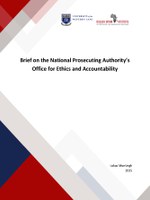Brief on the National Prosecuting Authority’s Office for Ethics and Accountability | by Lukas Muntingh (2025)
The OEA has two primary functions: to manage and investigate complaints against members of the NPA, and to cultivate a culture of ethics within the organisation. These functions are carried out through two internal divisions: the Ethics Management and Advocacy Division (EMAD), which focuses on promoting ethical norms and preventive strategies, and the Complaints Management and Investigation Division (CMID), which handles the intake, processing, and resolution of complaints from the public and NPA staff.
Regulations define who may lodge a complaint—ranging from accused persons and victims to legal representatives and Members of Parliament—and specify 24 types of complaints, broadly grouped into service delivery issues, improper conduct, and maladministration or corruption. While the broad scope signals seriousness, the regulations lack clarity on procedures, timeframes, and oversight mechanisms. For instance, although the regulations require acknowledgment of complaints and outline general reporting duties, they do not mandate timelines for investigation completion or provide for appeals. Additionally, there is no assurance that systemic issues—rather than just individual misconduct—will be addressed.
The OEA’s lack of structural independence is a central concern. Housed in the office of the National Director of Public Prosecutions (NDPP), its head is a Special Director reporting to the NDPP, raising questions about impartiality, especially when complaints involve senior officials. Moreover, the development of the regulations was reportedly internal and opaque, with no clear public consultation or parliamentary oversight, possibly breaching legal requirements for legislative transparency.
The document critiques the limited guidance provided by the NPA’s existing Code of Conduct, which has not been updated since 2010 and lacks explicit reference to constitutional values like transparency and accountability. While a supporting Code of Ethics exists, it is not grounded in legislation and may be revised under the OEA’s mandate.
Operationally, there are concerns about implementation: the public's ability to distinguish NPA staff in court settings, the use of a private company to manage complaints, and the risk of insufficient resourcing. Despite these challenges, the OEA represents a needed step toward improved accountability in a prosecutorial service that has been widely criticised for its perceived lack of independence and responsiveness.
In conclusion, while the establishment of the OEA is legally overdue and conceptually important, its current structure and regulations may fall short of ensuring transparency, public trust, and genuine accountability within the NPA.

